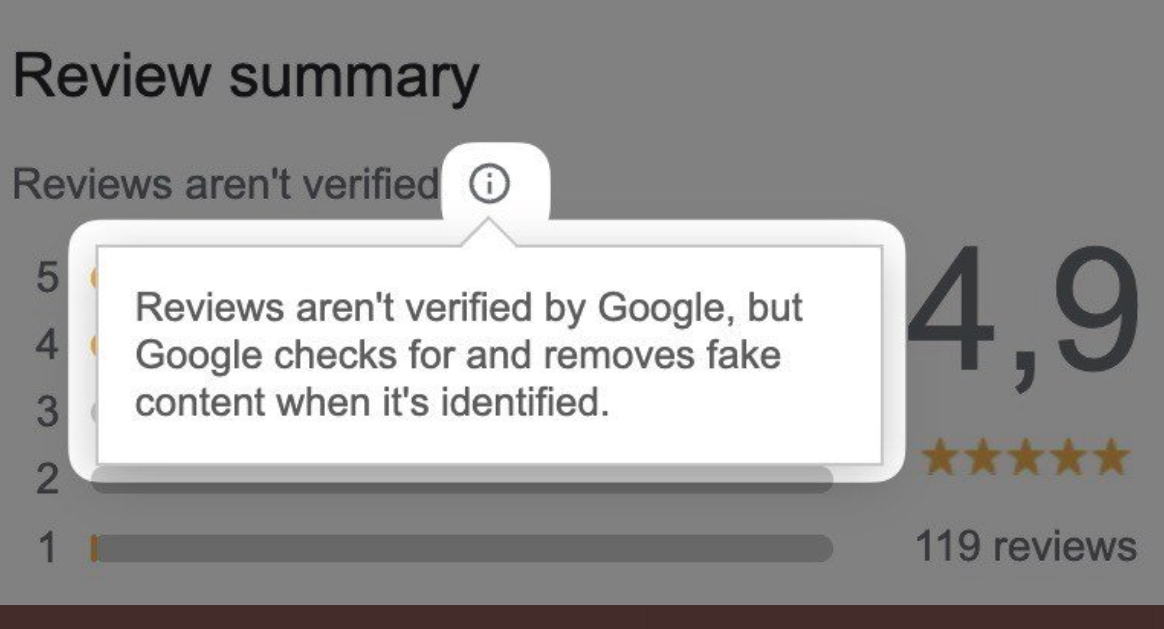Google LSA Spam, Catalog Comeback, Delivery Apps

LSAs, 'Verified Reviews' and Liability
A week ago Robin Dirksen discovered that Google was testing a "not verified" label for local reviews (see below). I assumed it was a "CYA" move by Google to disclaim the veracity of local reviews ("don't blame us"). Some people saw it as a prelude to Google implementing a review-verification system. Hopefully it is the latter, which begs the question of how rigorous any such system would be. But Google's significant fake reviews problem is quickly polluting Local Services Ads, which Google is expanding. One question that occurred to me about fake-review infected LSAs: Do the "Google Screened" and "Google Guaranteed" badges (designed to build consumer trust) create potential FTC liability because Google is "deceiving" the public by attaching the badges to profiles it knows include fake reviews? (There's also a broader LSA spam problem.)

Our take:
- A study in the UK (focused on Amazon) found that people shown fake reviews were more likely to buy inferior products and pay more for them.
- Ordinarily, Section 230 of the Communications Decency Act shields platforms from liability for content (e.g., fake reviews). But ...
- Google's LSA trust badges suggest it vouches for the integrity of LSA profiles. That creates an FTC "consumer deception" problem.
Paper Catalog Comeback
Over the past two-plus years, the cost of digital advertising has gone up and returns have declined, according to marketer surveys. That has caused some advertisers to take a second look at traditional media, including printed catalogs. Research presented in the Harvard Business Review shows that traditional product catalogs are (or have again become) highly effective marketing vehicles for retailers. But there are qualifications. The findings: 1) catalogs + email boosted purchases 24% over email only; 2) catalogs were more effective with customers who did more than 50% of their shopping in stores; 3) catalogs with images and short narratives were 40% more effective than those with just photos and product names; 4) catalogs with higher priced and "hedonic" products had a 120% higher ROI than those featuring "utilitarian" products.

Our take:
- A 2022 survey from DigitalCommerce360 found email was most influential in driving online sales; catalogs/direct mail was number two.
- For years digital and traditional media have worked together to extend each other's reach. This study is consistent with general, earlier findings.
- Another benefit of printed catalogs: they can provide a kind of "real-world presence" for online-only brands.
Delivery Apps' Outlook Murky
During the pandemic, delivery apps such as DoorDash, Instacart and Uber Eats were surging. Adoption, revenues and valuations grew dramatically. There were ethics complaints about driver treatment, wages and the impact on local restaurants, but they still enjoyed massive gains. Now that people have returned to in-store shopping and dining – and especially because of inflation – food delivery is facing existential challenges. The WSJ captures the moment: "Inflation has risen to a four-decade high ... making food delivery more expensive." Valuations have fallen "more than 50% in the past 12 months, compared with the less than 20% decline in the Nasdaq Composite Index." Most recently, DoorDash bought Bbot, which enables on-site digital ordering and payments and works with hotels as well as restaurants. Uber Eats has also diversified delivery services. But there's a fundamental question about profitability and sustainability over the long term.

Our take:
- E-commerce was also expected to grow indefinitely. The reopening of retail stores caused it to slow and flatten – similar to food delivery.
- Delivery apps will need to shift from convenience to broader utility. Novelty has worn off, fees are prohibitive, quality is also an issue.
- Absent more change, audiences and usage frequency will shrink (e.g., Whole Foods delivery declined by 50%+ since the $10 surcharge).
Recent Analysis
- Near Memo episode 74: Amazon, Google pander to the FTC, Privacy Act opt-in/out battle, Instagram's new searchable map is promising.
- ICYMI: A Look at Google Local Results without 'Self-Preferencing' by Mike Blumenthal.
Short Takes
- The growing importance of images in search.
- Suarespace overhaul makes websites even more DIY friendly.
- Microsoft making display ad gains (at Google's expense?).
- Google's SERP increasingly at center of abortion battle.
- Google Meet calls can now be livestreamed on YouTube.
- American Data Privacy Act may get a vote, antitrust bills may not.
- FCC takes on wireless carrier "abuse of location" (and other) data.
- Streamers stealing sports from broadcast, cable TV (NYT).
- Netflix bypassing Apple 30% tariff with new external links.
- TikTok to release of VR headsets and compete with Meta.
- Behold: The 'TikTokization' of media.
- Inside Amazon's controversial employee performance review process.
- Tracking the ROI of live (sporting) events.
- Anti-Instagram app BeReal is surging in popularity.
- Apple has LTV/CAC ratio of 16x vs 5x industry standard.
Listen to our latest podcast.

How can we make this better? Email us with suggestions and recommendations.

